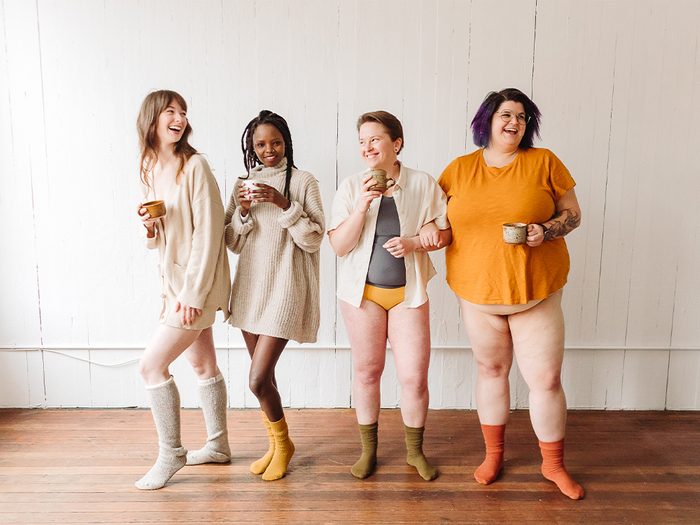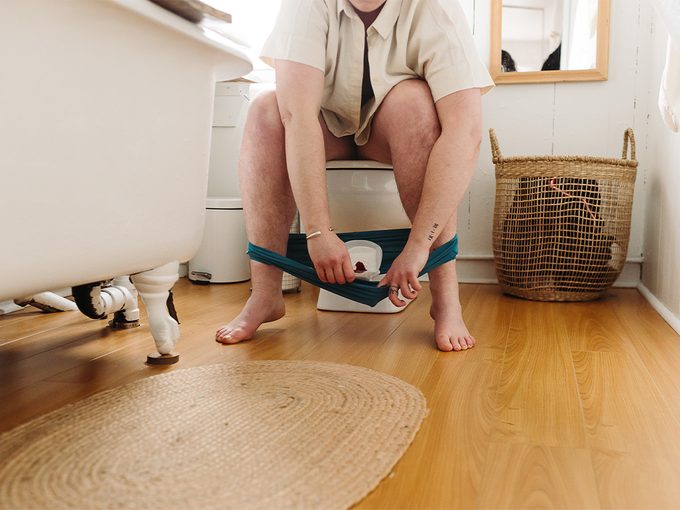Meet Joni, a Biodegradable Menstrual Pad for All

Plus, we tried Joni to see if the affordable and biodegradable pads are worth the swap.
Periods, and period products, have a huge impact on the environment. One UK-based organization, Friends of the Earth, found that people who menstruate toss out 400 pounds of period-related waste in their lifetimes. Even worse, a lot of the waste (think tampon applicators, pad wrappers, pads themselves) languish for years before—if ever—degrading.
Thankfully, there’s been a boom in reusable menstrual products recently: from period undies to menstrual cups to reusable pads. Now, not only do menstruators have a wider range of choice when it comes to period hygiene, but these new products also have a smaller eco footprint.
Despite the win for sustainability, the up-front cost of these reusable alternatives means that they’re not fully accessible to everyone. Period panties, for example, cost anywhere between $20 to $60 per pair — and ideally, you’d have more than one. Meanwhile, a pack of 54 tampons cost about $10 at Walmart. The cost may even out in the long run, but the initial investment makes reusable products an inaccessible option for many. In Canada, period poverty affects nearly one quarter of menstruators, with 17 percent of Canadians who menstruate having to choose between buying period products and other essential goods “more times than they can count”.
(Related: What You Need to Know About COVID-19 Vaccines and Your Period)
Enter Joni: a B.C.-based company aiming to make sustainable and affordable pads for all menstruators, regardless of gender, location and class. Joni is the brainchild of Jayesh Vekariya and Linda Biggs, who co-founded the company to tackle period poverty. While Vekariya was studying for his Masters of Business in Entrepreneurship at the University of Victoria, he learned that 1 in 3 Canadians under the age of 25 couldn’t afford period products. The statistic shocked him, especially when he dug deeper into the research and discovered that that study only accounted for straight, cis women with internet access. “So, the reality would be way worse than what this study showed,” he says.
Joni pads are made of bamboo, cornstarch and biodegradable paper and plastic, and are about 92 percent biodegradable after 12 months. SAP (super absorbent polymer) accounts for the other 8 percent, which “significantly reduces the weight of the product, which decreases its carbon footprint,” says Vekariya. SAP is also non-toxic, so it won’t pollute water sources.

The bamboo might also be a more sustainable option when compared to traditional pads, which are typically made of cotton. Bamboo grows quickly, can be cultivated with little to no fertilizer or chemicals and produces 35 times more oxygen than a similar sized-tree (though, it’s important to note that while bamboo plants are better for than environment than cotton, the way that bamboo fabric is produced can actually be much more taxing on the environment than cotton). The combination of USDA and Eco-Cert Organic bamboo and corn starch makes the pads absorbent and breathable. Biggs says it takes 10 times less water to manufacture Joni pads than traditional cotton ones and they are three times softer and more absorbent. “It’s not only going to absorb the blood, but it’s also going to allow your vulva to breathe,” she says. “A lot of the issues that people have from pads is because the plastic pads don’t breathe, which leads to UTIs and rashes.”
(Related: Meet Lyocell, a Potentially Sustainable Fabric That Could Become Your New Favourite Textile)
Another huge plus? It’s affordable: a box of 8 day pads costs $5.60 and a box of 6 overnight pads also costs $5.60. Plus, shipping is free anywhere in Canada, so we can all access the same product for the same price.
I tried Joni pads and loved the experience. I found the day pads offered just the right amount of coverage and I didn’t experience any leaks or uncomfortable “oh-yes-I’m-on-my-period-and-my-pad-is-full” feelings — even on my heaviest day. The length was also perfect, especially since I sometimes leak out of the front or back of pads. Their super-long overnight pads were also ultra-absorbent without feeling diaper-like, which is my biggest menstrual pad no-no.
Overall, Joni pads are a great, sustainable and inclusive alternative to traditional pads. I’ll stick with them as I venture back into the “real world” post-pandemic and need more leak support.
Joni pads, starting at $5.60/8 pack, getjoni.com.
Next, this is why you get migraines on your period (and how to stop them).




